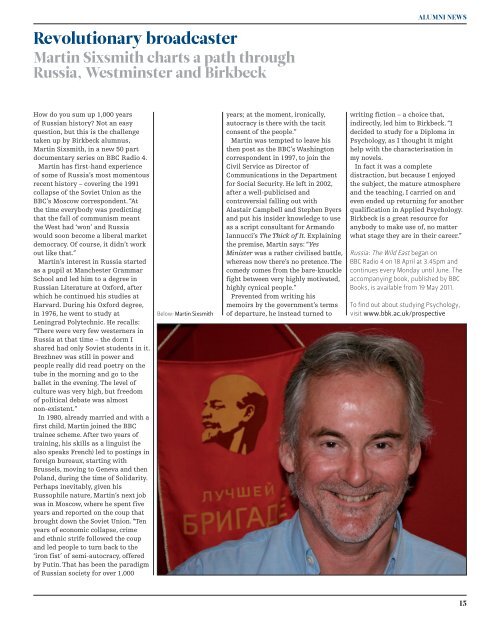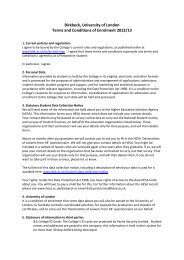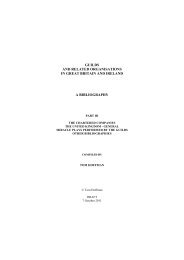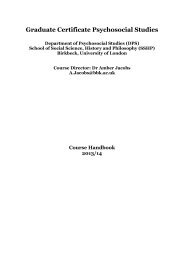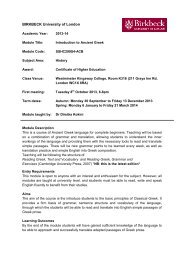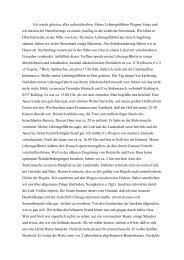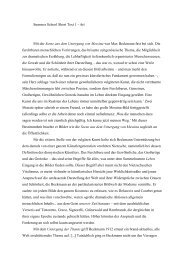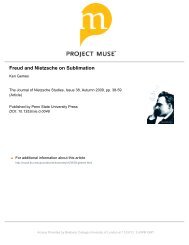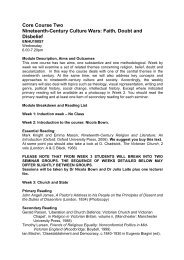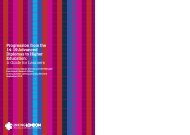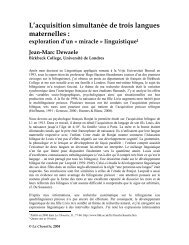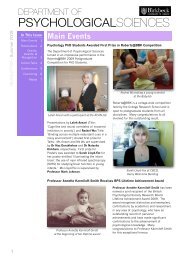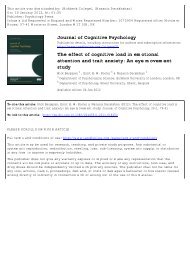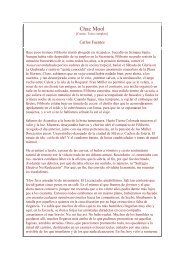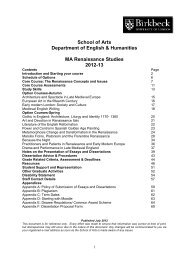Spring 2011 - Birkbeck College
Spring 2011 - Birkbeck College
Spring 2011 - Birkbeck College
Create successful ePaper yourself
Turn your PDF publications into a flip-book with our unique Google optimized e-Paper software.
Revolutionary broadcaster<br />
Martin Sixsmith charts a path through<br />
Russia, Westminster and <strong>Birkbeck</strong><br />
How do you sum up 1,000 years<br />
of Russian history? Not an easy<br />
question, but this is the challenge<br />
taken up by <strong>Birkbeck</strong> alumnus,<br />
Martin Sixsmith, in a new 50 part<br />
documentary series on BBC Radio 4.<br />
Martin has first-hand experience<br />
of some of Russia’s most momentous<br />
recent history – covering the 1991<br />
collapse of the Soviet Union as the<br />
BBC’s Moscow correspondent. “At<br />
the time everybody was predicting<br />
that the fall of communism meant<br />
the West had ‘won’ and Russia<br />
would soon become a liberal market<br />
democracy. Of course, it didn’t work<br />
out like that.”<br />
Martin’s interest in Russia started<br />
as a pupil at Manchester Grammar<br />
School and led him to a degree in<br />
Russian Literature at Oxford, after<br />
which he continued his studies at<br />
Harvard. During his Oxford degree,<br />
in 1976, he went to study at<br />
Leningrad Polytechnic. He recalls:<br />
“There were very few westerners in<br />
Russia at that time – the dorm I<br />
shared had only Soviet students in it.<br />
Brezhnev was still in power and<br />
people really did read poetry on the<br />
tube in the morning and go to the<br />
ballet in the evening. The level of<br />
culture was very high, but freedom<br />
of political debate was almost<br />
non-existent.”<br />
In 1980, already married and with a<br />
first child, Martin joined the BBC<br />
trainee scheme. After two years of<br />
training, his skills as a linguist (he<br />
also speaks French) led to postings in<br />
foreign bureaux, starting with<br />
Brussels, moving to Geneva and then<br />
Poland, during the time of Solidarity.<br />
Perhaps inevitably, given his<br />
Russophile nature, Martin’s next job<br />
was in Moscow, where he spent five<br />
years and reported on the coup that<br />
brought down the Soviet Union. “Ten<br />
years of economic collapse, crime<br />
and ethnic strife followed the coup<br />
and led people to turn back to the<br />
‘iron fist’ of semi-autocracy, offered<br />
by Putin. That has been the paradigm<br />
of Russian society for over 1,000<br />
Below: Martin Sixsmith<br />
years; at the moment, ironically,<br />
autocracy is there with the tacit<br />
consent of the people.”<br />
Martin was tempted to leave his<br />
then post as the BBC’s Washington<br />
correspondent in 1997, to join the<br />
Civil Service as Director of<br />
Communications in the Department<br />
for Social Security. He left in 2002,<br />
after a well-publicised and<br />
controversial falling out with<br />
Alastair Campbell and Stephen Byers<br />
and put his insider knowledge to use<br />
as a script consultant for Armando<br />
Iannucci’s The Thick of It. Explaining<br />
the premise, Martin says: “Yes<br />
Minister was a rather civilised battle,<br />
whereas now there’s no pretence. The<br />
comedy comes from the bare-knuckle<br />
fight between very highly motivated,<br />
highly cynical people.”<br />
Prevented from writing his<br />
memoirs by the government’s terms<br />
of departure, he instead turned to<br />
ALUMNI NEWS<br />
writing fiction – a choice that,<br />
indirectly, led him to <strong>Birkbeck</strong>. “I<br />
decided to study for a Diploma in<br />
Psychology, as I thought it might<br />
help with the characterisation in<br />
my novels.<br />
In fact it was a complete<br />
distraction, but because I enjoyed<br />
the subject, the mature atmosphere<br />
and the teaching, I carried on and<br />
even ended up returning for another<br />
qualification in Applied Psychology.<br />
<strong>Birkbeck</strong> is a great resource for<br />
anybody to make use of, no matter<br />
what stage they are in their career.”<br />
Russia: The Wild East began on<br />
BBC Radio 4 on 18 April at 3.45pm and<br />
continues every Monday until June. The<br />
accompanying book, published by BBC<br />
Books, is available from 19 May <strong>2011</strong>.<br />
To find out about studying Psychology,<br />
visit www.bbk.ac.uk/prospective<br />
15


